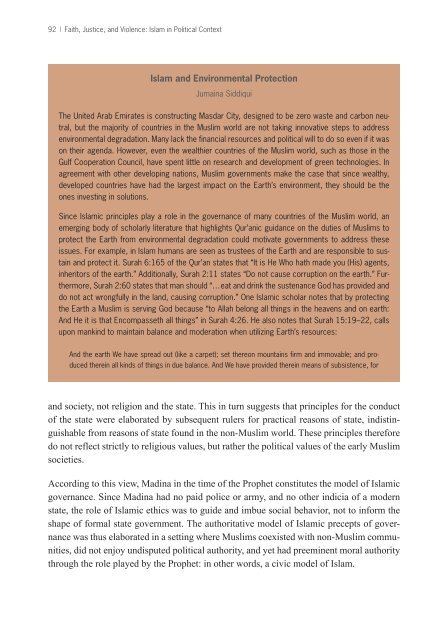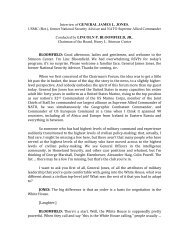Islam and Politics - The Stimson Center
Islam and Politics - The Stimson Center
Islam and Politics - The Stimson Center
Create successful ePaper yourself
Turn your PDF publications into a flip-book with our unique Google optimized e-Paper software.
92 | Faith, Justice, <strong>and</strong> Violence: <strong>Islam</strong> in Political Context<br />
<strong>Islam</strong> <strong>and</strong> Environmental Protection<br />
Jumaina Siddiqui<br />
<strong>The</strong> United Arab Emirates is constructing Masdar City, designed to be zero waste <strong>and</strong> carbon neutral,<br />
but the majority of countries in the Muslim world are not taking innovative steps to address<br />
environmental degradation. Many lack the financial resources <strong>and</strong> political will to do so even if it was<br />
on their agenda. However, even the wealthier countries of the Muslim world, such as those in the<br />
Gulf Cooperation Council, have spent little on research <strong>and</strong> development of green technologies. In<br />
agreement with other developing nations, Muslim governments make the case that since wealthy,<br />
developed countries have had the largest impact on the Earth’s environment, they should be the<br />
ones investing in solutions.<br />
Since <strong>Islam</strong>ic principles play a role in the governance of many countries of the Muslim world, an<br />
emerging body of scholarly literature that highlights Qur’anic guidance on the duties of Muslims to<br />
protect the Earth from environmental degradation could motivate governments to address these<br />
issues. For example, in <strong>Islam</strong> humans are seen as trustees of the Earth <strong>and</strong> are responsible to sustain<br />
<strong>and</strong> protect it. Surah 6:165 of the Qur’an states that “It is He Who hath made you (His) agents,<br />
inheritors of the earth.” Additionally, Surah 2:11 states “Do not cause corruption on the earth.” Furthermore,<br />
Surah 2:60 states that man should “… eat <strong>and</strong> drink the sustenance God has provided <strong>and</strong><br />
do not act wrongfully in the l<strong>and</strong>, causing corruption.” One <strong>Islam</strong>ic scholar notes that by protecting<br />
the Earth a Muslim is serving God because “to Allah belong all things in the heavens <strong>and</strong> on earth:<br />
And He it is that Encompasseth all things” in Surah 4:26. He also notes that Surah 15:19–22, calls<br />
upon mankind to maintain balance <strong>and</strong> moderation when utilizing Earth’s resources:<br />
And the earth We have spread out (like a carpet); set thereon mountains firm <strong>and</strong> immovable; <strong>and</strong> produced<br />
therein all kinds of things in due balance. And We have provided therein means of subsistence, for<br />
<strong>and</strong> society, not religion <strong>and</strong> the state. This in turn suggests that principles for the conduct<br />
of the state were elaborated by subsequent rulers for practical reasons of state, indistinguishable<br />
from reasons of state found in the non-Muslim world. <strong>The</strong>se principles therefore<br />
do not reflect strictly to religious values, but rather the political values of the early Muslim<br />
societies.<br />
According to this view, Madina in the time of the Prophet constitutes the model of <strong>Islam</strong>ic<br />
governance. Since Madina had no paid police or army, <strong>and</strong> no other indicia of a modern<br />
state, the role of <strong>Islam</strong>ic ethics was to guide <strong>and</strong> imbue social behavior, not to inform the<br />
shape of formal state government. <strong>The</strong> authoritative model of <strong>Islam</strong>ic precepts of governance<br />
was thus elaborated in a setting where Muslims coexisted with non-Muslim communities,<br />
did not enjoy undisputed political authority, <strong>and</strong> yet had preeminent moral authority<br />
through the role played by the Prophet: in other words, a civic model of <strong>Islam</strong>.

















